New discovery sheds light for precision medicine in cancer
A recent study published in Cancer Research highlights findings of a molecular indicator that could provide a new way for doctors to help predict how patients will respond to certain anticancer drugs. The research comes from scientists at Université de Montreal and could pave the way for novel methods of precision medicine.
The molecular indicator is composed of a group of enzymes called SRC kinases, which work to chemically modify a tumor-suppressing protein called SOCS1.
"SOCS1 is part of a gene-regulation circuit centered around the master cell proliferation regulator p53, often called the guardian of the genome," said senior author Gerardo Ferbeyre, a biochemist from Université de Montreal. "If p53 or another protein in its network is mutated or becomes chemically modified in some abnormal way, a pattern of gene activation occurs that programs cells to proliferate without control, as occurs in cancers."
This may sound complex (it is), but what it means is that the authors discovered another way in which p53 can become unbalanced, which results in the proliferation of cancer cells. This discovery will help predict if an anticancer drug could be an effective treatment for a patient’s tumor.
Subburaj Ilangumaran, a Université de Sherbrooke biochemist on the study, explained: "This new mechanism for SOCS1 inactivation may actually represent a regulatory control that is hijacked by cancer cells. On a more fundamental level, our group's discovery -- that phosphorylation of SOCS1 acquires a new physical form -- opens the door to hitherto unknown ways of regulating SOCS1 functions. And this has implications for the treatment of autoimmune diseases and for anticancer immunity."
UdeM PhD student Emmanuelle Saint-Germain added, "We were able to detect phosphorylated SOCS1 in patients' samples with an antibody that we developed. The same antibody could be used to detect phosphorylated SOCS1 in a clinical setting, providing a way to decide whether SRC kinase inhibitors would be an effective treatment."
Sources: Science Daily, Cancer Research









